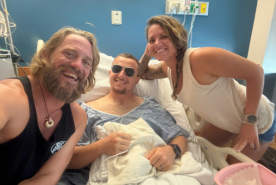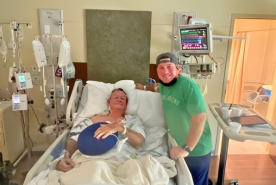Last updated: October 04, 2024
Costs related to living donation can be covered by a recipient’s health insurance and financial assistance programs. National & state laws also protect living donors’ rights.
Which Medical Costs Are Covered
Medical Costs Covered by your Recipient’s Insurance
Your recipient’s health insurance will cover the medical costs related to your donation. These costs will be covered whether you are a a directed donor (know your recipient) or non-directed donor (don’t know your recipient). Covered costs include:
- Your evaluation at the transplant center (lab work, imaging like X-ray, CT scans, etc.)
- Surgery to remove the kidney you are donating
- Time in the hospital after surgery
- Follow-up appointments
Medical Costs Not Covered by Your Recipient’s Insurance
If you are missing any normal appointments or tests that are considered “routine healthcare”, like yearly visits to the dentist and OBGYN visits for female donors, those are not covered by your recipient’s health insurance. This is because these appointments are not related to the donation process and every person, whether they want to become a living donor or not, should be keeping up with their healthcare. What you may need to cover could include but is not limited to:
- Colonoscopies (for donors over the age of 50)
- Mammograms (for female donors over the age of 40)
- Annual visits to OBGYN for all female donors
- Dental Exams
Not all transplant centers require donors to have their own health insurance to be approved to donate, so if you don’t have your own, your transplant social worker can help to find free or low-cost clinics near where you live.
Other Costs Related to Donating
While medical costs related to donation are covered by your recipient’s health insurance, there are additional expenses that aren’t usually covered. Your transplant social worker will talk to you about these costs at your evaluation and will be able to help find programs that might cover these expenses, including:
- Lost wages: During your recovery from surgery, you’ll want to make sure that being out of work won’t affect you financially. You can talk to your employer about taking paid leave or short-term disability. If you do not have paid leave or short-term disability with your employer, you might qualify for lost-wage reimbursement through NLDAC, NKR or other programs.
- Time off from work: You'll need to make sure that you take can time off from work for your evaluation, surgery and recovery period. You can take FMLA (Family and Medical Leave Act) or paid/unpaid leave through a state-level protection.
- Travel expenses: If you live far from the transplant center where you’re donating, there will be travel costs for you and your care partner during your evaluation and surgery. Your recipient is allowed to cover these costs (out of pocket or through fundraising) if they’re able to, but that shouldn’t be expected. Your social worker will talk to you about programs that might cover your expenses for:
- Lodging (hotel, house rental, etc.)
- Some transplant hospitals offer free or low-cost hospitality houses for you and your family. You can ask your transplant social worker for more information.
- Gas, car rental or flight
- Meals
- Lodging (hotel, house rental, etc.)
- Dependent care: If you have children or take care of an adult, you’ll need to make sure that a friend or family member will be able to step in during your surgery and while you recover. You can talk to your social worker about financial programs that might help cover costs of dependent care, if needed.
Living Donor Protection Laws
Many states have passed laws to not only protect the rights of living donors, but also make it easier for more people to donate. Check out this map to see what protections your state has.
National/Federal Protections
- Health Insurance
- The Affordable Care Act has made it illegal in all states for any health insurance company to refuse to cover you or charge you more because you have donated a kidney.
- The Family Medical Leave Act
- FMLA protects you from losing your job while you take time off for surgery and recovery. FMLA protects your job for up to twelve weeks, though most living donors only need four to six weeks for recovery. FMLA is for everyone, at any center. You can talk to your Human Resources (HR) department at your job for more information.
State Protections
Check out this map to see what protections your state has.
- Life, Disability and Long-term Care Insurance
- In some states, it is illegal for insurance companies to deny you or charge you more for your monthly premium (payment) because you donated an organ.
- Donors rarely report having any issues with their insurance companies after they donate, but if you experience any issues, reach out to your transplant team for support.
- In some states, it is illegal for insurance companies to deny you or charge you more for your monthly premium (payment) because you donated an organ.
- Leave from Work
- Some states require employers to give you paid or unpaid leave for donating and recovery, depending on the type of employer you work for:
- Federal Government: If you work for the federal government, you’ll receive 30 days paid leave for organ donation. This leave is separate from your sick and annual leave.
- State Governments: If you work for a state government, you may receive up to 30 days leave (paid or unpaid) for donating. This leave is separate from your sick and annual leave.
- Private Companies: If you work for a private company, you may receive a certain amount of paid or unpaid leave from work to donate.
- Some states require employers to give you paid or unpaid leave for donating and recovery, depending on the type of employer you work for:
Tax Deductions and Credits
Many states have tax deductions or credits for donor’s expenses related to donation that are not covered through a financial assistance program. Click below to learn more.
Questions for my Healthcare team
- Am I able to get any financial assistance for costs not covered by my recipient’s insurance?
- Can you help me find low-cost or free health clinics for my routine doctor’s appointments? (if you don’t have health insurance)
- How can I find out more about if there is a way for me to get paid time off work to donate?
- What paired exchange programs does your center offer that might also help with my donor costs?
More resources
- Learn more about living donor state laws and policies (State Resources)
- Ask questions about transplant and living donation (NKF CARES)
- Make a difference by joining NKF’s Voices for Kidney Health (NKF Voices)


















